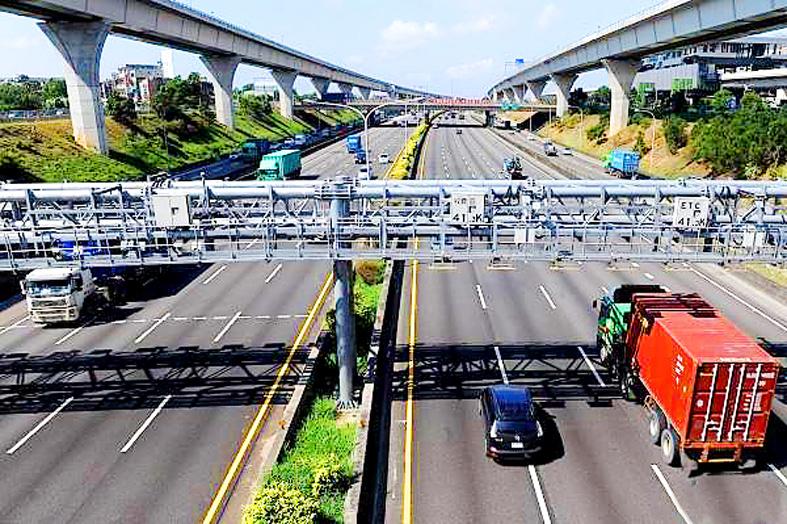Far Eastern Electronic Toll Collection Co has on Sept.29 signed a contract with BGSR Consortium to jointly build an electronic toll collection system on Thailand’s M6 and M81 highways.
It would be the first time that Far Eastern exports the technology and service to one of the 18 countries included in the government’s New Southbound Policy, the company said.
The two highways, which are part of a 20-year development plan by the Thai government, have a total length of 330km, the company said.

Photo: Chen Hsin-yu, Taipei Times
The M6 connects central Thailand with the northeastern region, while the M81 connects the west of the country.
Thailand has a population of nearly 70 million and more than 18 million registered vehicles, Far Eastern said.
Its newly designed toll system would be operational in 2025 on the two routes, the company said, adding that it would train local professionals to operate it.
The system would enable Thailand to tackle traffic congestion, which has been slowing economic development, in a smarter way, it said.
Far Eastern managing director Chang Yung-chang (張永昌) said that the COVID-19 pandemic has caused more countries to develop zero-contact toll systems.
Far Eastern’s system has helped Taiwan manage freeways more efficiently, Chang added.
Taiwan is the first country to have such a system installed on all freeways, the company said, adding that the nation’s system manages 3.2 million vehicles per day, with 16 million transactions.
The system’s transaction accuracy rate and toll collection success rate reached 99.9 percent and 99.97 percent respectively, it said.
The company in the third quarter of this year tasked its subsidiary FETC International to trial an electronic toll collection system on Thailand’s M9, the company said.
Before the end of this year, the subsidiary would conduct a similar trial in Malaysia, which includes the development of an e-wallet app.

Alain Robert, known as the "French Spider-Man," praised Alex Honnold as exceptionally well-prepared after the US climber completed a free solo ascent of Taipei 101 yesterday. Robert said Honnold's ascent of the 508m-tall skyscraper in just more than one-and-a-half hours without using safety ropes or equipment was a remarkable achievement. "This is my life," he said in an interview conducted in French, adding that he liked the feeling of being "on the edge of danger." The 63-year-old Frenchman climbed Taipei 101 using ropes in December 2004, taking about four hours to reach the top. On a one-to-10 scale of difficulty, Robert said Taipei 101

Nipah virus infection is to be officially listed as a category 5 notifiable infectious disease in Taiwan in March, while clinical treatment guidelines are being formulated, the Centers for Disease Control (CDC) said yesterday. With Nipah infections being reported in other countries and considering its relatively high fatality rate, the centers on Jan. 16 announced that it would be listed as a notifiable infectious disease to bolster the nation’s systematic early warning system and increase public awareness, the CDC said. Bangladesh reported four fatal cases last year in separate districts, with three linked to raw date palm sap consumption, CDC Epidemic Intelligence

US climber Alex Honnold left Taiwan this morning a day after completing a free-solo ascent of Taipei 101, a feat that drew cheers from onlookers and gained widespread international attention. Honnold yesterday scaled the 101-story skyscraper without a rope or safety harness. The climb — the highest urban free-solo ascent ever attempted — took just more than 90 minutes and was streamed live on Netflix. It was covered by major international news outlets including CNN, the New York Times, the Guardian and the Wall Street Journal. As Honnold prepared to leave Taiwan today, he attracted a crowd when he and his wife, Sanni,

Two Taiwanese prosecutors were questioned by Chinese security personnel at their hotel during a trip to China’s Henan Province this month, the Mainland Affairs Council (MAC) said yesterday. The officers had personal information on the prosecutors, including “when they were assigned to their posts, their work locations and job titles,” MAC Deputy Minister and spokesman Liang Wen-chieh (梁文傑) said. On top of asking about their agencies and positions, the officers also questioned the prosecutors about the Cross-Strait Joint Crime-Fighting and Judicial Mutual Assistance Agreement, a pact that serves as the framework for Taiwan-China cooperation on combating crime and providing judicial assistance, Liang